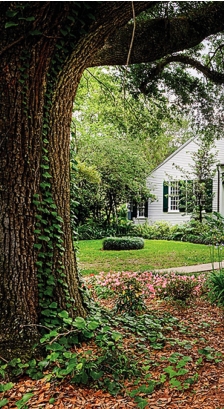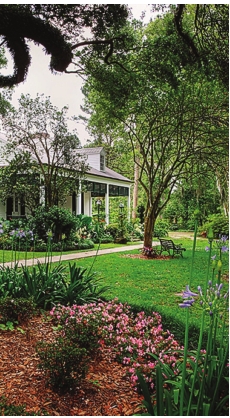Aunt Ollie’s place preserves history in garden oasis in the heart of Baton Rouge.
 Visiting
her family’s homestead as a child, Juliet Steele Youngblood did not
realize the land’s significance. She remembers the daily sit-down meal –
whether it was lunch or supper – and being dressed up like a doll. She
remembers her brother trouncing through the grounds, even jumping in the
fountains.
Visiting
her family’s homestead as a child, Juliet Steele Youngblood did not
realize the land’s significance. She remembers the daily sit-down meal –
whether it was lunch or supper – and being dressed up like a doll. She
remembers her brother trouncing through the grounds, even jumping in the
fountains.
“It was just Aunt Ollie’s place,” the Shreveport resident said.
The
plantation, however, would go on to serve people throughout Louisiana,
the nation and even the world as a piece of Southern history for 50
years and counting. The Burden Museum and Gardens, located in the heart
of Baton Rouge, shows children and adults a glimpse of rural life,
provides a means of agricultural research and serves as a natural oasis
in a bustling city. It attracts visitors from across the United States
and abroad.
The Burden family donated their 440 acres of farmland and woods to Louisiana State University in 1966.
 “We
continue to be indebted to the Burden family for their vision to use
this property to benefit the people of Louisiana through education and
research,” said LSU Vice President for Agriculture William Richardson in
a release. “The LSU AgCenter Botanic Gardens at Burden is one of the
nation’s premier research and extension centers dedicated to urban
agriculture and horticulture.”
“We
continue to be indebted to the Burden family for their vision to use
this property to benefit the people of Louisiana through education and
research,” said LSU Vice President for Agriculture William Richardson in
a release. “The LSU AgCenter Botanic Gardens at Burden is one of the
nation’s premier research and extension centers dedicated to urban
agriculture and horticulture.”
Youngblood,
who is married to Thomas P. Youngblood, is a direct descendent of the
Burden family. Marriage brought her northbound on I-49.
Shreveport has been her place of residence for nearly 30 years, but the
Baton Rouge area will always be home. Youngblood is an executive member
of the Burden Family Foundation Board and the Whispers of Change Board.
She travels south throughout the year.
The Burden Museum and Gardens consists of the LSU AgCenter Botanic Gardens, LSU Rural Life Museum and Windrush Gardens.
The
LSU AgCenter Botanic Gardens is a collection of plants and flowers, as
well as a place for study in agriculture. LSU AgCenter students frequent
the area, studying the land’s rich environment. The gardens contain the
Rose Garden, Children’s Garden and All-America Selections Display
Garden. They host a range of annual events with a corn maze in the fall,
a poinsettia sale during the holidays and an herb day in the spring.
The gardens also host a wine and roses event in October.
The
LSU Rural Life Museum is one of the Top 10 Outdoor Museums in the
World, according to the British Museum. Though large, rich plantations,
called “the big houses” by many, typically depict the Antebellum South,
the LSU Rural Life Museum displays life on a rural plantation. With a
commissary, kitchen, overseer’s house, slave cabins, schoolhouse, sugar house, blacksmith shop and grist mill, visitors can discover how those in the rural 19th century South – both slaves and free – lived.
Adorned with crepe myrtles, live oaks, azaleas and camellias, the Windrush Gardens are a fusion of the American South and Europe. Youngblood’s ancestor, Steele Burden, who always said he wanted to be a yard man, brought in sculptures of Greek and Roman gods, giving the Louisiana spot a worldly feel.
“You can’t hear anything,” Youngblood said, “it’s pure tranquility.”
Though the museum and gardens are in the center of Baton Rouge, located just off I-10 on Essen Lane, the peaceful, otherworldly energy transports visitors far from the busy city.
Youngblood is thankful that allowing LSU to preserve her family’s home has helped it to remain in its natural state. If it would not have been well cared for, as it has been, the fields of electric fuchsia azaleas would be transformed into gray, dead concrete.
“Steele Burden said, ‘Make the world a bit better for the sake of living in it,’ and that was truly the way he lived his life – and his family as well,” said Louisiana Public Broadcasting’s Tika Laudun in a release. “Burden Museum and Gardens is a place for people to enjoy and experience a part of Louisiana’s rich history.” LPB created a documentary commemorating the 50th anniversary of the Burden family’s donation called “Burden Museum & Gardens: A Family’s Gift.” The documentary is available for streaming on lpb.org.
The Burden Museum and Gardens is open 8 a.m. to 5 p.m. daily, with exceptions on major holidays. General admission to the Rural Life Museum is $10 for adults, with discounts for children, seniors, groups and LSU staff.
Youngblood is thankful to see her ancestors’ home provide education and entertainment for Louisiana’s people. As the legend continues on, she’s still thankful for Aunt Ollie’s place, but perhaps with a little more weight than she knew as a child.
“I’m humbled, but proud.”
– Tara Bullock